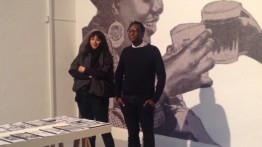The Otolith Group, "How to Build an Interscalar Vehicle"
Thursday, November 3, 2022, 7 - 8:30pm

In science-fiction dreams of interstellar travel, characters travel distances unbridgeable by conventions of Newtonian mechanics. They arrive at impossible destinations, worlds that teach them new ways of seeing and being. Let’s attempt similarly impossible journeys. What happens when we treat empirical objects as interscalar vehicles, as means of connecting stories and scales usually kept apart? (Gabrielle Hecht)
The Otolith Group, which was founded by artists and theorists Anjalika Sagar and Kodwo Eshun in 2002, will be in conversation with their comrade and fellow traveller, the theorist and writer Laura Harris as part of the Fall 2022 IDS Lecture Series which are free and open to the public. The anatomical entity of the otolith operates as a kind of figurative black box for withholding intention and calculating discrepancy. Articulating the idea of the Otolith with the idea of the Group alludes to the histories of collective practices invented by artists that theorise and theorists that practice art within and beyond the Dis-United Kingdom. The post-cinematic practice of Eshun and Sagar is informed by an aesthetics of the essayistic that takes the form of a science fiction of the present in which moving images, sonic speculations, performances, publications and installations explore the intertemporal crises and interscalar catastrophes that construct the Racial Capitalocene.
The Otolith Group have recently exhibited at Kunstraum Innsbruck, Austria; CCA Wattis, San Francisco; Tate Britain, London; Haus der Kulteren der Welt, Berlin; Carnegie International, 57th Edition, Pittsburg; Rubin Museum of Art, New York; National Museum of Modern and Contemporary Art, Seoul; Villa Empain-Fondation Boghossian, Brussels; Sharjah Biennial 13; 11th Gwangju Biennale; Institute of Contemporary Art, Philadelphia; Museum of Contemporary Art Chicago; Thyssen-Bornemisza Contemporary Art, Vienna and Museo Serralves, Porto. The Otolith Group's solo exhibition Xenogenesis was presented at Van Abbemuseum, Eindhoven; Institute for Contemporary Art at Virginia Commonwealth University, Richmond; Buxton Contemporary, Melbourne; Southern Alberta Art Gallery, Lethbridge; the Sharjah Art Foundation, Sharjah and is currently at (IMMA) The Irish Museum of Modern Art, Dublin until February 2023.
Laura Harris is associate professor of cinema studies and art & public policy at New York University. She is the author of Experiments in Exile: C. L. R. James, Hélio Oiticica and the Aesthetic Sociality of Blackness (Fordham University Press, 2019). She has also published in Social Text, Women & Performance, Criticism, The South Atlantic Quarterly and other journals.
Proof of complete COVID-19 vaccination and booster is required. The use of a face mask is encouraged while indoors.
The IDS public lecture series is part of the Robert Lehman Visiting Artist Program at The Cooper Union. We are grateful for major funding from the Robert Lehman Foundation. The IDS public lecture series is also made possible by generous support from the Open Society Foundations.
Located in the Frederick P. Rose Auditorium, at 41 Cooper Square (on Third Avenue between 6th and 7th Streets)




